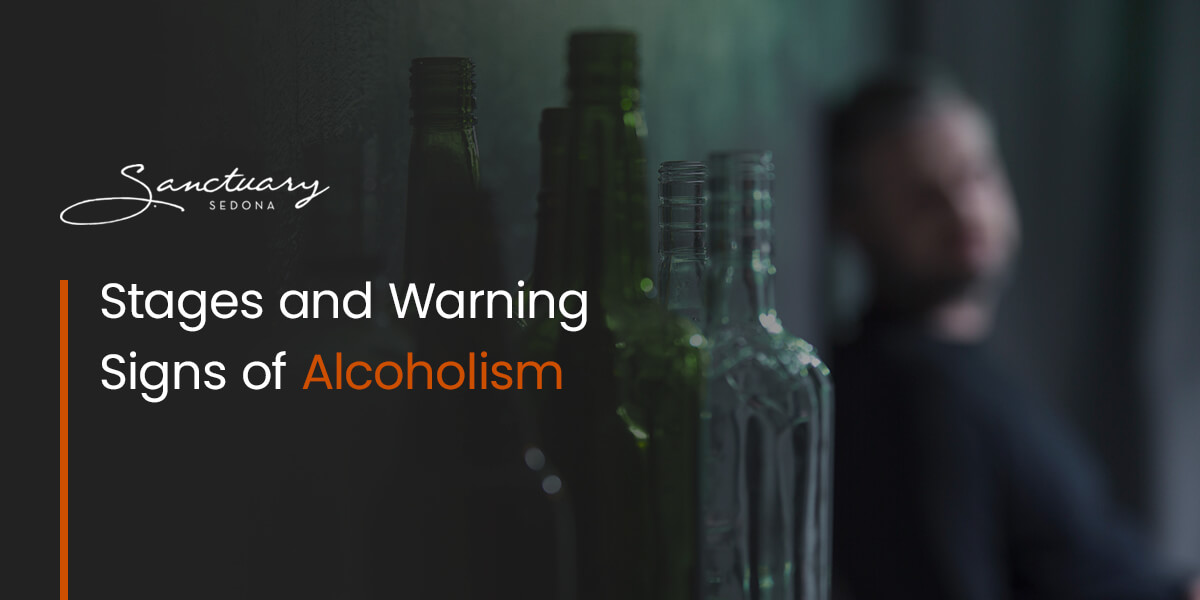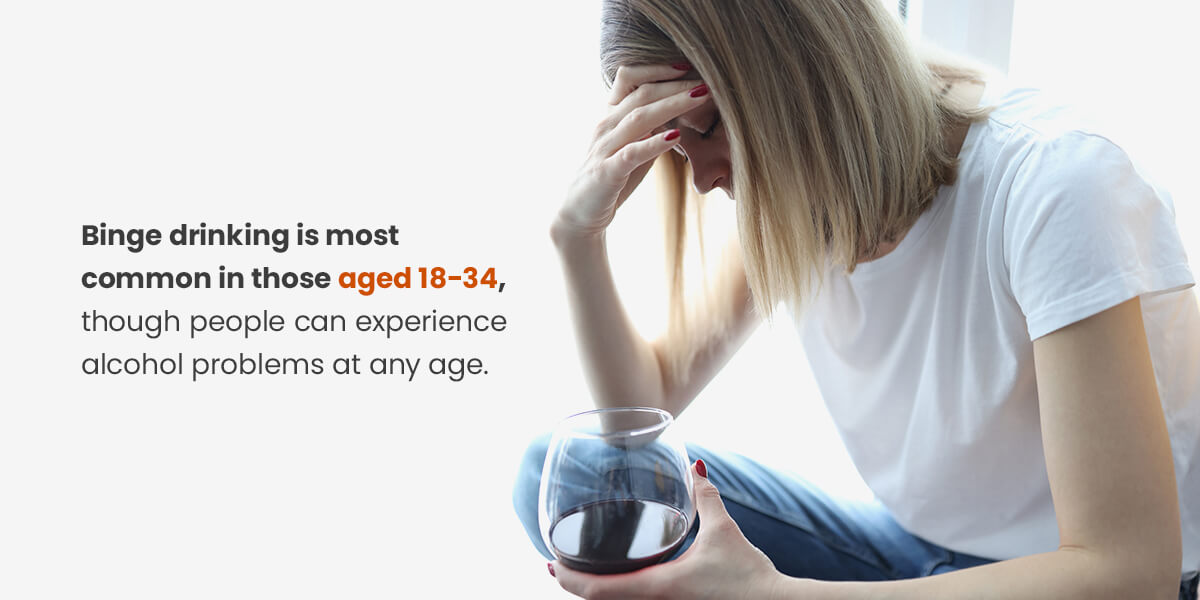It’s perfectly okay to drink in moderation, such as having a glass of wine with dinner or the occasional drink with friends. However, periodic drinking can gradually elevate to addiction if you aren’t careful. Alcohol is by far the most commonly misused substance among teens and young adults in the United States.
Excessive alcohol use interferes with the brain’s chemical activity and function, causing a pattern of intoxication, intense cravings and withdrawal. Alcoholism can have detrimental short- and long-term effects on the body, mental health and personal life. Understanding the stages and warning signs of alcoholism is a pivotal first step in getting the help you or a loved one needs.
Continue reading to learn how to recognize alcoholism, along with treatment options you can pursue to break free from this destructive cycle.
What Is Alcoholism?
Alcoholism is an addiction to drinking alcohol due to physical and emotional dependence. It’s the compulsive need for alcohol and the effects it provides. Alcohol addiction can involve any type of alcoholic beverage, whether beer, wine, hard liquor or a combination of them.
Alcoholism can range from mild to severe. A minor drinking problem can quickly spiral into uncontrollable binge drinking. The more a person unhealthily uses alcohol, the more their body and brain depend on it. Alcoholism shouldn’t be taken lightly. It requires proper intervention, support and rehabilitation, just like any other type of addiction.
When left unaddressed, it continues to damage a person’s physical and mental well-being, and it can have life-threatening effects. It can sometimes be difficult to catch an alcohol addiction right away, especially since social drinking is both a legal and common activity. Recognizing the warning signs and stages of alcoholism is critical to getting the help you or a loved one needs.
Why Do People Misuse Alcohol?
While anyone can develop an alcohol addiction, certain factors can put people at a higher risk. Alcoholism typically affects people who:
- Have a family history of alcohol and other substance misuse problems.
- Are frequently exposed to social environments where others are heavily drinking.
- Start experimenting with alcohol during adolescence.
- Struggle with mental health and intergenerational trauma.
- Experience loneliness or isolation.
- Have low self-esteem and high stress levels.
A person can become addicted to alcohol for a variety of reasons. When they’re experiencing a stressful job or life situation, for instance, they may turn to alcohol as an escape or coping mechanism. Mental health challenges like depression, anxiety and bipolar disorder can also increase the risk of alcohol addiction.
It can be easy for a person to turn to drinking when they’re feeling stressed, anxious or depressed. The effects of alcohol can mask those emotions, causing them to drink more and more. That’s why mental health disorders and substance use often coincide.
Additionally, the risk of alcoholism can increase when you have a parent or other relative who struggles with this issue. Both genetics and your surrounding environment can contribute to your drinking habits. Being around people who drink excessively may persuade you to engage in the same behavior.
Stages of Alcoholism
How does an alcohol addiction develop? Below are the general stages of alcoholism and the effects that come with each.
1. Occasional Misuse and Binge Drinking
Similar to any addiction, alcoholism generally starts with periodic misuse and experimentation. The individual might be new to alcohol and wants to test their limits. That’s why alcoholism is prevalent in teenagers and young adults.
Drinking is a common social activity in this age range, and high school or college students may collectively binge drink at parties or gatherings. Binge drinking is most common in those aged 18-34, though people can experience alcohol problems at any age.
The person may try binge drinking during this initial stage. Even if they don’t drink regularly, they may consume large amounts at a time. The National Institutes of Health (NIH) defines binge drinking for men as five or more alcoholic beverages in about two hours. For women, binge drinking is four or more alcoholic drinks in two hours.
Binge drinkers often surpass the four- or five-drink mark, experiencing higher blood alcohol content (BAC). A misconception about binge drinking is that it’s safe when it’s only occasional, but that isn’t the case. Even if the person doesn’t drink regularly, binge drinking can put them at risk of developing an alcohol use disorder (AUD) and cause severe mental and physical side effects.
Binge drinking is incredibly dangerous as it can lead to alcohol poisoning or overdose. For some people, it only takes one time. Alcohol poisoning occurs when your BAC is so high that it can be fatal. Drinking too much too quickly can:
- Slow your heart rate.
- Complicate breathing.
- Lower your body temperature.
- Hinder your gag reflex that prevents choking.
- Cause mental confusion, seizures or unconsciousness.
- Cause a coma, permanent brain damage or death.
Those who find pleasure in the feelings they get from drinking, such as a temporary escape or euphoria, may start to increase their alcohol consumption and move to the second stage.
2. Increased Drinking/Problem Drinking
A person enters the second stage when their consumption becomes more habitual. Rather than only drinking occasionally or at parties, they may start misusing alcohol every weekend or multiple days a week.
Frequent alcohol use differs from moderate or occasional drinking, as it often involves a higher emotional attachment to alcohol. One might use it to escape stress, anxiety, depression or loneliness. It could also be a way to combat boredom or an excuse to hang out with friends. They may turn to alcohol to feel better about themselves or their life.
As their alcohol consumption grows more regular, they become more dependent on it, further increasing their risk of addiction. Frequent alcohol misuse can quickly lead to problem drinking. During this stage, they may grow more anxious and depressed or lose sleep. They may feel sick from heavy drinking but crave the effects too much to care.
Problem drinking can lead to legal trouble like drinking and driving, reduced social activity and relationship issues.
3. Alcohol Dependency
Problem drinking can quickly escalate to dependence. Once a person reaches this stage, they’ve become so attached to alcohol that it controls their daily activities and routine. They may be aware of its risks but have no control over their drinking habits.
The body’s alcohol tolerance increases during this phase. That means the individual must drink larger quantities to feel the effects. As mentioned previously, increased alcohol consumption can have damaging physical and mental effects on the body.
Withdrawal is also standard in this stage. When the body is deprived of alcohol, the individual may experience a variety of unpleasant symptoms, such as:
- Tremors and shaking
- Nausea and vomiting
- Loss of appetite
- Sweating
- Increased heart rate
- Insomnia
- Clammy skin
- Severe irritability or mood swings
- Jumpiness or nervousness
- Headaches or migraines
- Confusion and disorientation
Alcohol withdrawal can also lead to delirium tremens, a condition causing intense symptoms like body tremors, confusion, agitation and hallucinations. Severe delirium tremens can cause medical emergencies like high fevers and seizures.
4. Alcohol Addiction
Addiction is the final stage of alcoholism. The person no longer drinks for pleasure. At this point, they have developed a physical and psychological need for alcohol and cannot function without it. They often behave erratically and compulsively, drinking whenever and wherever they please. In some cases, alcoholism may open the door to other substance addictions, as well.
Aside from short-term effects and withdrawal symptoms, alcoholism can have damaging long-term effects, including:
- High blood pressure, heart disease, heart attack or stroke
- Weakened immune system
- Brain or nerve damage
- Sexual dysfunction
- Malnutrition and vitamin deficiency
- Mental health disorders like anxiety and depression
- Cognitive decline
- Ulcers
- Cancer in the throat, mouth, liver or colon
On top of physical effects, alcoholism can damage relationships and careers. Legal trouble from drinking will reflect on a permanent record, which can affect the ability to drive a vehicle and find a job.
Warning Signs of Alcoholism
If you or a loved one suspect alcoholism, here are some common signs that indicate the need for treatment:
- Withdrawal symptoms when not drinking
- Intense cravings and high tolerance
- Consuming larger quantities of alcohol than intended
- Difficulty lowering alcohol consumption
- Blackouts and difficulty remembering what happened the night before
- Significant time spent drinking alcohol and recovering from the effects
- Reckless, compulsive behavior, such as driving while intoxicated or disorderly conduct
- Poor personal hygiene
- Strong alcohol smell on the breath or clothing
- Defensive response when confronted about drinking
- Preoccupation or obsession with alcohol and getting the next drink
- Lost interest in hobbies and activities once enjoyed
- Problems with work, school, relationships or family responsibilities
- Continuous drinking despite adverse mental, physical and social effects
- Unsuccessful attempts to quit in the past
If you notice these signs in a loved one or yourself, it’s essential to consult a professional that can help you determine the appropriate treatment route.
Holistic Alcohol Addiction Treatment
Breaking the cycle of alcoholism can be challenging, but professional treatment and support can make all the difference in your recovery journey. If you or a loved one is struggling with alcohol addiction, The Sanctuary at Sedona may be the solution you need.
We incorporate a holistic, non-12-step approach for alcohol addiction treatment. When you enroll in our program, you’ll stay at our beautiful rehabilitation center in Arizona. Here, you have 24/7 access to our caring on-site staff, gourmet meals, essential resources and a safe environment to help you conquer your addiction.
Our supportive and attentive team will guide you through your healing journey, personalizing your treatment plan to your unique challenges and needs. Unlike traditional addiction treatment methods that merely help manage symptoms, our holistic and integrative care focuses on the whole person — the body, mind, soul and spirit.
We can help you address the root cause of your addiction so you can make deep, transformative changes and rediscover yourself. Alcoholism weighs heavily on the body, mind, soul and spirit, so we encourage healing techniques that address each system. Here are some integrative treatment methods offered in our alcohol addiction treatment program.
1. Cognitive Behavioral Therapy
Cognitive behavioral therapy (CBT) aims to help people change their thinking or behavioral patterns. A CBT therapist can help you discover the source of your addiction, helping you practice coping mechanisms to face your challenges.
First, your therapist will conduct an initial assessment. They’ll ask questions about your current situation, when your symptoms started and any recent changes. They may also ask about your family, relationships and mental health history.
Based on your answers to these questions, your therapist can help you identify your values, set therapy goals and make concrete thought and behavioral changes. CBT uses our knowledge of the brain to apply real-world skills, which aim to reduce your addiction symptoms so you can better engage with life.
2. Nutritional Therapy
Alcoholism can have damaging effects on nutrition. Properly fueling the body is an important step in restoring your physical health and strength after the harmful effects of addiction. Through our holistic nutritional therapy program, you can nourish yourself with nutrient-rich food, giving you the energy you need to start your recovery journey.
We know that every person has unique dietary requirements. Our nutritional therapists have the necessary knowledge and skills to support your needs. They can help you manage your nutrient intake through diet changes, oral supplements and intravenous (IV) therapy. Overcoming addiction requires caring for your body, and nutrition plays a critical role.
3. Movement Therapy
We integrate body movement therapy into our addiction treatment approach, as it helps people become proactively involved in their health. Movement therapy also encourages people in addiction recovery to tap into and convey their emotions.
Through movement activities like Pilates, yoga, dance and Tai Chi, you can discover a healthy outlet to express yourself, relax, identify emotions and process addiction-related trauma. Movement therapy is an effective holistic treatment that caters to the body, mind and spirit simultaneously.
4. Expressive Arts Therapy
Our expressive arts therapy program allows you to express yourself and access your emotions through various art mediums. You can also rekindle old passions and hobbies you enjoyed before addiction — or discover new artistic talents during your recovery journey. You can try a variety of art forms to engage the senses and benefit your transformation and growth, including:
- Drawing and painting
- Sculpting
- Journaling
- Writing and reading stories or poetry
- Dancing
- Playing or listening to music
- Writing songs
- Performing theater or improv
- Developing life maps
- Creating memory books
- Making videos
Previous art experience isn’t a requirement to participate in expressive arts therapy. The goal is to help you discover new paths and reconnect with old ones, communicating your thoughts and emotions in a healthy, creative way.
Get Holistic Treatment for Alcoholism at The Sanctuary
Don’t let alcohol addiction affect your health, relationships and quality of life any longer. If other addiction treatment methods haven’t worked for you, holistic care from The Sanctuary at Sedona may be your answer.
We can help you treat the underlying cause of your addiction through integrative strategies that target the body, mind, soul and spirit. That way, you can actively change your thoughts and behaviors and return to the life you desire. Contact The Sanctuary today to learn more about our holistic therapy programs or begin your recovery journey from alcohol addiction.
He is the Founder, Administrator, Counselor at the Sanctuary at Sedona. He has a BA in Political Science and is currently Senior teaching staff at Four Winds Society, an international school of energy medicine. His credentials also include being an Ordained Minister; a Certified Shamanic Breathwork® Facilitator; a Founding Member Society for Shamanic Practitioners; a Member of Association for Comprehensive Energy Psychology; a Member of the National Institute for Holistic Addiction Studies. [email protected]






